Category: Business
THE IMPORTANCE OF A BUSINESS TAX RECEIPT: WHY YOU CANNOT AFFORD TO IGNORE IT!

As a business owner, there are many important documents you need to keep track of to ensure compliance with tax laws and regulations. One of the most critical documents is the business tax receipt (BTR).
A BTR, formerly known as an Occupational License, confirms that a business has paid its taxes in full for a specific period. The BTR serves as proof that the business has complied with its tax obligations and is up to date with its tax payments.
Maintaining a valid BTR is crucial for several reasons:
-
-
- Compliance with Tax Laws – a BTR is proof that your business has met its tax obligations, which helps to ensure compliance with tax laws and regulations. Without a valid BTR, you may be subject to fines, penalties, and even audits from the tax authorities.
- Bank Account Opening - many banks and financial institutions require a valid BTR as part of the process for opening a business bank account. Without a valid BTR, you may not be able to open an account or may face restrictions on your business accounting activities.
- Government Contracts - when bidding for government contracts, a BTR is often required as part of the bidding process. This ensures that the government can verify your business compliance with tax laws and regulations before awarding the contract.
- Supplier and Vendor Requirements - many suppliers and vendors require a valid BTR, before they will do business with your business, to ensure your business is financially stable and compliant with tax laws.
-
How to obtain a Business Tax Receipt in the City of Miami Beach?
The City of Miami Beach Finance Department provides clear steps, expectations and a thorough explanation of BTR requirements that are user friendly. A Certificate of Occupancy (CO) and Certificate of Use (CU) may be necessary prior to occupancy of any commercial, industrial, or office location. If you are doing interior remodeling or alterations that require a permit, you will need to complete the work and obtain all final inspections prior to applying for the CO and/or CU. Then the business may apply for the BTR, which is proof of payment of the business tax and is required before a business opens or starts.
CO applications are reviewed by the Building Department, CU applications are reviewed by the Planning Department, and BTR applications are reviewed by the Finance Department Customer Service Center team. The BTR and CU application process emulates how other municipalities and counties administer their business licenses.
All businesses wishing to operate in the City of Miami Beach must first obtain a CU
To apply for a CU online, please follow the instructions below:
-
-
- Go to: http://www.mbselfservice.com (note: application reviews may result in a request for additional information/documentation).
- Request a Fire Inspection via Citizen Self Service Portal (CSS) at http://www.mbselfservice.com.
- Once the Fire Inspection is approved, the CU will be automatically issued, and business may apply for your
-
To apply for a BTR please follow these instructions:
-
-
- Go to the Citizen Self Service Portal (CSS) at: http://www.mbselfservice.com
- The following is required for a BTR application to be reviewed:
- Valid CU
- Florida Department of Environmental Resources Management (DERM)* approval
- Valid Lease/Recorded Warranty Deed
- Articles of Incorporation
- Federal Identification Number (FEIN)
- Fictitious Name (if applicable)
- Additional documentation may be required based on business type.
*DERM approval is required for all businesses, except professionals, home-based businesses, short-term rentals, and mobile car washes. For more information on how to apply to get a DERM inspection for your CU, click here
-
Applications meeting all the above requirements, upon verification, will be approved and issued a BTR immediately. All BTRs must be renewed, annual, by September 30th of each year.
To apply online for a BTR, please visit our Citizen’s Self Service.
For an on-line directory of current Business Tax Receipts please click here.
If you would like to apply in person, but need an application click here.
Applicants with questions may contact the City of Miami Beach at 305.673.7420 or mbhelp@miamibeachfl.gov.
UNITY in CommUNITY!
Pride Month is a month-long celebration that recognizes the LGBTQ+ community and their contributions to society. It is a time to acknowledge the challenges faced by this community and to stand in solidarity with their fight for equality, acceptance, and human rights. Pride Month is a joyful and colorful display of love, unity, and resilience, with events and activities that promote inclusivity, educate the public, and celebrate the diversity of sexual orientations and gender identities. In honor of Pride Month, we sat down with Herb Sosa, the Executive Director of Unity Coalition to learn more about how the organization is assisting the LCBTQ community in Miami Beach.
Tell us a little about yourself and how you came to call Miami Beach your home:
 I was born in Miami to Cuban exile parents who met/married here. My journey so far has taken me from living in Palm Springs, Hialeah, North, Kendall, and Little Havana to where I call home – Miami Beach.
I was born in Miami to Cuban exile parents who met/married here. My journey so far has taken me from living in Palm Springs, Hialeah, North, Kendall, and Little Havana to where I call home – Miami Beach.
Professionally, I was the creative director of Burdines department stores for many years, and I designed across Florida and later nationwide with Federated stores. I then opened my own company for branding & design and later started Ba=BaLU Shops – a collection of Cuban-themed boutiques. Voted one of Condé Nast magazine’s top 10 destinations in the world! I have always had a passion for architecture, history, and social conscience. As executive director of Miami Design Preservation League and Art Deco Weekend, president of Dade Heritage Trust, and chairing the Miami Beach Historic Preservation Board, I have led a lifelong commitment to my community and its legacy and a passion for making things better. This led to both establishing an online monthly bilingual publication – AMBIENTE digital magazine, since 2003 and co-founding Unity Coalition|Colación Unida – a Florida nonprofit dedicated to the leadership of Latinx/Hispanic & Indigenous LGBTQI+ communities, with programming across South Florida and Colombia, since 2002.
What is Unity Coalition?
Unity Coalition is an organization for the Latinx|Hispanic & Indigenous LGBTQ+ community, advancing Equality & Fairness, through Education, Leadership and Awareness, since 2002, With programming in Miami Beach & Bogotá. Most of our programming has been created and focuses on the ever-changing and evolving needs of our community. We are proud to also have a truly diverse and professional board of directors, advisors and volunteers that listen, respond, and lead with actions and solutions to the many challenges we face. Some great examples of this came during the global pandemic of 2019. We recognized that one. Of course, we are thrilled to call Miami Beach home since 2001, and much of our programming has roots right here.
What is your annual fundraiser? - Our (14) annual Celebrate ORGULLO Hispanic & Indigenous PRIDE Festival, held every October, was an initiative created in unison with Mayor Matti Herrera-Bower to shed light on Miami Beach's diverse population and cultural heritage, and brings Art, Music, Theater and Pride events for 15 days, across South Florida. In 2022 the Celebrate ORGULLO Festival was named #4 of TripSaavy's 13 unique LGBT Events around the world!
What are some of your 2024 initiatives?

1. TRANSART Conference & Artists Showcase: Showcasing the talent, vision and possibilities within the transgender community, the 10th annual TRANSART brings together a collection of talents, individuals & artistic genres to create awareness, nurture aspiring artists and enlighten the public.

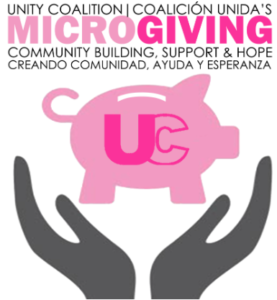
3. MicroGIVING Incubator FUND: This fund proudly brings MicroGiving to the South Florida LGBTQ+ community, with focus on what individuals need RIGHT NOW, and the opportunity to help you get one step closer to stability, prosperity, giving back and fulfilling your dreams – over $72,000 given out to date. Applications available online, year-round, for Seed Funding & Mentoring, and offered as a onetime award in the following categories: Personal Well-Being & Needs Based; -Educational Development; -Start Ups, -Visioning and Community Building.
For mor information, please visit www.unitycoalition.org
Return to Newsletter Home Page with Latest Articles and Spotlights
 Celebrate the Story of LGBTQIA+ in Tech
eMerge Americas and the City of Miami Beach invite you to an extraordinary #MiamiTech Happy Hour pop-up event, celebrating the vibrant intersection of LGBTQIA+ and technology within our dynamic community.
Celebrate the Story of LGBTQIA+ in Tech
eMerge Americas and the City of Miami Beach invite you to an extraordinary #MiamiTech Happy Hour pop-up event, celebrating the vibrant intersection of LGBTQIA+ and technology within our dynamic community.
In partnership with Chris Adamo and Natalia Martinez-Kalinina, this unique event promises an evening filled with networking, music, light bites, and drinks. Attendees will also enjoy an exciting live startup pitch competition judged by Miami Beach Vice Mayor Laura Dominguez.
Connect with eMerge America’s 2024 Startup Alumni, who will be showcasing the innovation and entrepreneurial spirit that make Miami Beach a growing #MiamiTech ecosystem
Event Details:
Date: Tuesday, June 11, 2024
Time: 6:00pm – 9:00pm
Location: Medium Cool Cocktail Lounge, 1690 Collins Ave #2, Miami Beach, FL 33139
Don’t miss this opportunity to engage with fellow tech enthusiasts and celebrate the diverse voices that drive our tech community forward. The City of Miami Beach is committed to fostering a tech-friendly environment and is proud to support events that highlight the innovation and inclusivity of the #MiamiTech community.
Register here!
Meet Victoria Pelletier: Corporate Executive and Public Speaker
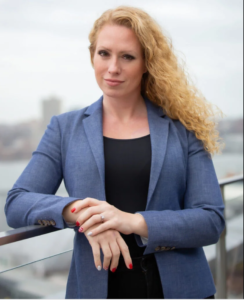
June marks the start of LGBTQ+ Pride Month. A time dedicated to the celebration and commemoration of lesbian, gay, bisexual, transgender, queer and other identities. It seeks to honors LGBTQ+ history and the challenges the community. Pride Month honors the 1969 Stonewall Uprising in New York City. The riots began on June 28, when police officers raided the Stonewall Inn, a gay club located in Greenwich Village, which led to days of protests and violent clashes with law enforcement. In honor of Miami Beach Pride month, we are pleased to feature Victoria Pelletier, a LGBTQ+ activist and Miami Beach entrepreneur.
Victoria is a rare, impactful speaker, who you hear once, and remember fondly. A Canadian native, she has overcome her share of challenges from an early age. Born to a drug-addicted and abusive teenage mother, Victoria was blessed to be adopted by loving parents. Her supportive family allowed her to be herself and express herself freely. She came out as bisexual in her teens and later married in her twenties. Married to her wife of eleven years, she gave birth to their two children; during the second pregnancy, her wife was diagnosed with cancer and many years later, she passed away from a reoccurrence. Victoria subsequently met her husband, who is equally proud of her openness, passion, and advocacy for the LGBTQ+ community.
Challenge, however, did not impede Victoria’s business acumen. She was a Chief Operating Officer at the age of 24, and has attained senior executive roles, in a highly competitive B2B environment. At IBM, she was a trailblazing leader - one of only 30 Out LGBTQ+ executives worldwide. Victoria has navigated the corporate world, and its many peaks and valleys, mergers, acquisitions, reorganizations, restructures, and more…. witnessing the impact of these business trials on careers, families and livelihoods.
“My challenges or obstacles have not been easy, and I have developed a multi-step process to a healthier way to be resilient and move forward. I think resilience is both innate as well as learned,” shares Victoria. “Being resilient is like building a muscle. I now enjoy spending my time speaking, sharing and coaching my community and helping others overcome or navigate their challenges.”
An inspiring speaker, for over 20 years, Victoria leveraged her natural talent to open a professional public speaking and coaching business 12 years ago. Some of her favorite Keynote titles include:
- Unstoppable: Creating a Life of No Excuses
- Influence Unleased: Forging a Lasting Legacy Through Personal Branding
- Embracing the Now: Empowered Employees and the Evolution of Whole Human Leadership
- Healthy Resilience: Navigating Adversity & Challenge to Shift from Survival to Thriving
- Diversity, Equity and Inclusion- A Culture of Strategic Intentionality
“Victoria is a prolific speaker, her personal stories carry so much strength, and she leaves her audience breathless and wanting more,” shares Nkechi Nwafor-Robinson, an executive, after hearing one of Victoria’s speeches.
Wanting to further embed her insight and experience, Victoria is also a published author of three books including:
- The Power of Whole Human Leadership; Managing Modern Workers Toward Purpose and Profit
- Influence Unleashed: Forging a Lasting Legacy Through Personal Branding
- Unstoppable: Stories of Change Makers Who Dare to Make a Difference
Victoria’s business guidance is “if you have a great idea that has potential market opportunity and are passionate about it, go for it! Follow your passion, even if that means keeping your day job until it is financially viable to transition fully into your own business. Entrepreneurs should not attempt to perform all business functions and instead understand their skills, surround themselves with others who have the skills that they do not have, delegate or outsource the skills that they are not proficient in, and where funding is a challenge, employ a barter system with other entrepreneurs you can collaborate and share their skills and vice versa. Lastly, but certainly not least, overcome your fear when starting your own business or reinventing yourself…One of Victoria’s favorite quotes: “Everything you've ever wanted lives on the other side of fear.” - George Addair
For more information on Victoria Pelletier, please visit: https://victoria-pelletier.com/
Return to Newsletter Home Page with Latest Articles and Spotlights
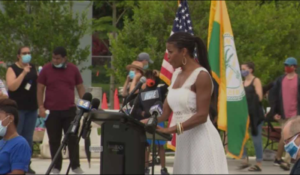
On June 2020, the City of Miami Beach held an important ceremony, in Pride Park, to commemorate the 155th Juneteenth Independence Day or Freedom Day. The commemoration marks June 19, 1865, the end of Black enslavement in the United States and the announcement of the end of the Civil War and the Emancipation Proclamation in Galveston Bay, Texas.
The event, featured remarks from community leaders and marked the country’s second independence day. The historical legacy of Juneteeth shows the value of never giving up hope in uncertain times. To honor the monumental event, a Rainbow Eucalyptus tree was planted to symbolize and celebrate the contributions of African Americans to Miami Beach, and be a community space where this spirit of hope lives on. This June 19, 2024, now a federal holiday, embrace the rich history of self-determination, citizenship and democracy, that magnified the hopes and dream of those Texans who held fast to the promise of true liberty for all.
Return to Newsletter Home Page with Latest Articles and Spotlights
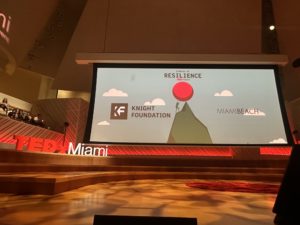
The TEDx Miami 2024 event, sponsored by the City of Miami Beach, was an inspiring gathering that celebrated the power of resilience and the transformative impact of thought leadership. Held at the iconic Miami Beach New World Center, the event drew a diverse audience, of more than 600, eager to hear the theme, “Stories of Resilience”. Each speaker shared their unique journey of overcoming adversity and pushing boundaries. From entrepreneurs, who rebuilt their businesses after devastating losses, to community leaders who have fostered unity in the face of division, to the stories highlighted the indomitable human spirit and its capacity for renewal and growth.
The event underscored the importance of thought leadership in shaping the future of Miami Beach. By fostering a culture of innovation and resilience, the city positions itself as a beacon for progress and a hub for creative minds. Thought leaders are not only catalysts for change but also essential contributors to the economic and social fabric of the community.
Miami Beach’s support for TEDx Miami exemplifies its commitment to nurturing an environment where businesses and individuals can thrive. The insights shared during the event offered valuable lessons for local entrepreneurs and business leaders. Emphasizing adaptability and forward-thinking strategies, the speakers provided actionable advice on navigating challenges and seizing opportunities in an ever-evolving market.
Andrew Parker, Founder and CEO, Papa: Andrew’s journey began with a personal mission to support his grandfather, which led to the creation of Papa, a platform providing companionship and support to older adults and families. His story emphasized the importance of empathy and innovation in addressing social needs.
Daniel Betts, Ph.D., CEO and Co-Founder, Blue Frontier: Daniel shared his vision for revolutionizing air-conditioning through Cleantech, showcasing how perseverance in research and development can lead to groundbreaking solutions that address climate challenges.
Mike Pell, Envisioneer, Author, Director, The Microsoft Garage – NYC: With over three decades in the tech industry, Mike’s talk on disruptive innovation highlighted the importance of bold thinking and relentless pursuit of breakthroughs in driving technological advancements.
Scott Shigeoka, Curiosity Expert, Speaker, and Award-Winning Author: Scott’s insights into the power of curiosity underscored how fostering inquisitive mindsets can enhance well-being and relationships, driving personal and professional growth.
Beena Ammanath, Author, Founder, Humans for AI: Beena’s work in AI ethics and responsible tech ecosystems demonstrated how technology, when guided by strong ethical principles, can lead to sustainable and impactful innovations.
Victoria Pelletier, Founder and CEO, Unstoppable You: Victoria’s commitment to diversity, equity, and inclusion provided a powerful example of how authentic leadership and a focus on community can create inclusive and thriving business environments.
Dr. Leila Allen, Associate Teaching Professor, Director of the Behavioral Neuroscience Undergraduate Program, FIU: Dr. Allen’s pioneering research in translational neuroscience and Alzheimer’s Disease showcased the importance of scientific resilience in tackling some of the most challenging health issues.
Kunya Rowley, Artistic Director, Hued Songs: Kunya’s dedication to accessible arts and community building through a multicultural lens highlighted the role of the arts in fostering social cohesion and celebrating cultural diversity.
TEDx Miami 2024 was more than just a series of talks; it was a celebration of resilience and a testament to the power of ideas to shape our future. Sponsored by the City of Miami Beach, the event highlighted the critical role of thought leadership in fostering a dynamic, resilient, and prosperous community. As the city continues to support platforms for innovation and inspiration, Miami Beach solidifies its reputation as a leader in both business and thought leadership.
Return to Newsletter Home Page with Latest Articles and Spotlights
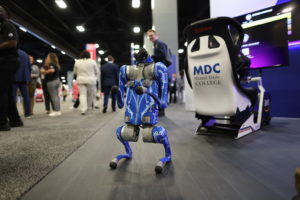
eMerge Americas 2024 celebrated its 10 year anniversary by showcasing the vibrant tech ecosystem of Greater Miami. The two-day conference, held at the Miami Beach Convention Center, drew approximately 20,000 participants and showcased Miami Beach as an evolving tech scene.
The creativity within and around the conference was unlimited, including dancing robots from Nova Southeastern University’s Levan Center of Innovation, setting an innovative tone. Local to global thought leaders emphasized the importance of creating an adaptable ecosystem to meet the challenges of rapid technological change, reflecting on Greater Miami’s evolution from Miami 1.0 to sought after tech hub.
eMerge Americas 2024 focused on the growing impact of AI and health tech with panels and discussions examining the latest innovations. Keynote speaker Reshma Saujani, founder of Girls Who Code and Moms First, delivered an inspiring talk on the importance of embracing imperfection and bravery, especially for women in tech. She highlighted the need to bridge the opportunity gap and empower women in technology and beyond. Armando Christian Pérez, ne’ Pitbull, shared his insights on local tech growth and his initiatives to support education, highlighting his involvement in Sports Leadership Arts Management (SLAM) schools. He also shared his foray into NASCAR, as a means to unite people through a universal language.
Attention to Startups was paramount, with pre-conference Founder mentoring for 110 companies participating in the eMerge Americas Startup Showcase. Notable startups included Tukki, which simplifies the US immigration process, and Blue Saturn, which offers AI-powered analysis for job applications. The Startup Showcase culminated with a pitch competition, with the top five (5) startups competed for a grand prize of $520,000. EVQLV, a Miami-based AI-powered venture focused on antibody discovery, emerged as the winner, and demonstrated the growing prowess in life sciences. Commissioner Joe Magazine served as a judge in the university track of the pitch competition which awarded Autoket, a Miami-based B2B automotive marketplace.
Miami Beach’s Make A Bold Move booth returned to the eMerge Americas exhibition floor showcasing new and expanding business innovations, cutting-edge technologies and business incentives, demonstrating Miami Beach’s commitment to fostering a thriving tech ecosystem.
Return to Newsletter Home Page with Latest Articles and Spotlights
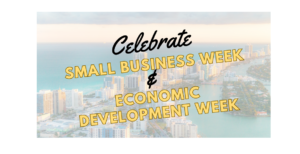
For more than 60 years, the National Small Business Week (April 28 – May 5, 2024) has applauded and celebrated the contributions of entrepreneurs and small businesses. This is a time that we acknowledge the hard work, ingenuity, and dedication small businesses and their influence our economies and communities.
Economic Development Week (May 6-10, 2024) is an opportunity to acknowledge the programs, best practices and special individuals, teams, and organizations that positively impact our residential and commercial communities. In Miami Beach, we promote and share the numerous efforts created to support, attract, and retain businesses in our emerging community to create a more economically vibrant and livable neighborhoods and diverse business corridors.
The City of Miami Beach Economic Development Department and local, regional, and national partners and stakeholders, including, but not limited to the Washington Avenue Business Improvement District, Lincoln Road Business Improvement District, 41st Street Business improvement District, Normandy Fountain Business Association, Miami Beach Chamber of Commerce, Miami Dade Economic Advocacy Trust, and Espanola Way Association, are the driving force behind numerous programs and initiatives designed to help entrepreneurs, investors, enterprising professional, and small businesses open, relocate and grow.
If you are interested in starting a business or expanding your business, Miami Beach offers business concierge services, technical assistance programs, and business incentives and grants. Please call us at 305.673.7572 or email us at MBBiz@miamibeachfl.gov.
For more information on these programs, please visit www.MBBiz.com and subscribe to the Economic Development Newsletter and stay connected and discover the tools available to build an ambitious, prosperous and productive business.


 83°
83° 